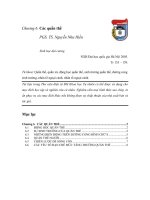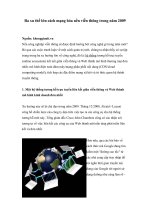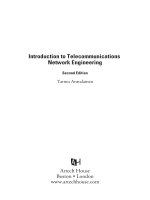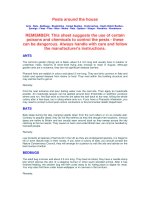Tài liệu GETTING AROUND THE MECHANICAL ENGINEERING DEPARTMENT pptx
Bạn đang xem bản rút gọn của tài liệu. Xem và tải ngay bản đầy đủ của tài liệu tại đây (813.64 KB, 54 trang )
GETTING AROUND
THE MECHANICAL ENGINEERING
DEPARTMENT
G AMED
Keep this guide to the ME Undergraduate Program
throughout your education. It has content useful to
sophomores, juniors, and seniors alike.
Massachusetts Institute of Technology
MechE Undergraduate Office | Room 1-110
77 Massachusetts Avenue | Cambridge MA 02139-4307
P: 617.253.2305 | E: me-undergradoffi | meche.mit.edu
SEPTEMBER
2012
2 Guide to Undergraduate Study in MechE
MechE Undergraduate Office 3
Contents
CONTENTS 3!
MECHE UNDERGRADUATE OFFICE 4!
WHAT IS MECHE ABOUT? 5!
UNDERGRADUATE STUDY IN MECHE 6!
BACHELOR OF SCIENCE IN MECHANICAL ENGINEERING/COURSE 2 7!
Requirements 8!
Typical Course 2 Flow Chart 10!
Scheduling Comments 11!
Sample Schedules for Course 2 12!
BACHELOR OF SCIENCE IN ENGINEERING AS RECOMMENDED BY THE
DEPARTMENT OF MECHANICAL ENGINEERING/COURSE 2-A 14
!
2-A Concentrations 15!
“Old 2-A” and “New 2-A” 17!
Double Majors with Course 2-A 17!
Requirements for class of 2015 or earlier (old 2-A) 18!
Scheduling Comments 19!
Sample Schedules for Course 2-A 20!
Requirements for class of 2016 or later (new 2-A) 22!
Typical Course 2-A Flow Chart (New degree program) 24!
Scheduling Comments 25!
Sample Schedules for Course 2-A 26!
Choosing a Concentration 28!
BACHELOR OF SCIENCE IN MECHANICAL AND OCEAN
ENGINEERING/COURSE 2-OE 29
!
Requirements 30!
Typical Course 2-OE Flow Chart 32!
Scheduling Comments 33!
Sample Schedules for Course 2-OE 34!
MINOR IN MECHANICAL ENGINEERING 36!
MINORS FOR MECH E STUDENTS 37!
ADDITIONAL PROGRAM INFORMATION 38!
Faculty Advising 38!
Communication Requirement 39!
SB Thesis Requirement 41!
4 Guide to Undergraduate Study in MechE
SPECIAL PROGRAMS 43!
Undergraduate Practice Opportunities Program (UPOP) 43!
Gordon Engineering Leadership (GEL) 43!
Undergraduate Research Opportunities Program (UROP) 44!
International Study 45!
RESOURCES FOR MECHE STUDENTS 46!
Computer Facilities and the ME Domain 46!
Student Organizations 47!
Publications and Forms 47!
MechE Optional Email Lists 48!
AFTER GRADUATION 49!
Graduate School and Graduate Fellowships 49!
Professional Registration 50!
Career Opportunities 51!
Starting Salaries 51!
Ethics and Professional Responsibility 52!
MechE Undergraduate Office
The mission of the MechE Undergraduate Office is to support the department’s
undergraduate programs and to help serve the academic needs of MechE
undergraduate students. At our office you can get information, forms, and
advice. The UG office is staffed by:
MechE Undergraduate Administrative Staff
Ms. Brandy Baker –
MechE Undergraduate Administrative Support
Ms. Heather Theberge –
MechE Undergraduate Officer
Professor Anette “Peko” Hosoi –
MechE Associate Undergraduate Officer
Professor Derek Rowell –
Course 2-A Coordinator
Professor Seth Lloyd –
Mechanical Engineering Undergraduate Office
Room 1-110
77 Massachusetts Avenue
Massachusetts Institute of Technology
Cambridge, MA 02139-4307
phone: (617) 253-2305
email:
MechE Undergraduate Office 5
What is MechE about?
Mechanical engineering is concerned with the responsible development of
products, processes, and power, whether at the molecular scale or at the scale
of large, complex systems. Mechanical engineering principles and skills are
needed at some stage during the conception, design, development, and
manufacture of every human-made object with moving parts. Many
innovations crucial to our future will have their roots in the world of mass,
motion, forces, and energy—the world of mechanical engineers.
Mechanical engineering is one of the broadest and most versatile of the
engineering professions. This is reflected in the portfolio of current activities in
the department, one that has widened rapidly in the past decade. Today, our
faculty are involved in projects ranging from, for example, the use of
nanoparticles to tailor the properties of polymers, to the use of active control
to optimize combustion processes; from the design of miniature robots for
extraterrestrial exploration, to the creation of needle-free drug injectors; from
the design and fabrication of low-cost radio-frequency identification chips, to
the development of efficient methods for robust design; from the development
of unmanned underwater vehicles, to the creation of optimization methods
that autonomously generate decision-making strategies; from the invention of
cost-effective photovoltaic cells, to the prevention of material degradation in
proton-exchange membrane fuel cells; from the use of acoustics to explore the
ocean of one of Jupiter’s moons, to the biomimetics of swimming fish; from
the development of physiological models for the human liver, to the
development of novel ways for detecting precancerous events; and from the
use of nanoscale antennas for manipulating large molecules, to the fabrication
of 3-D nanostructures out of 2-D substrates.
Our graduates go on to a vast array of careers in product design, research,
management, medicine, government, teaching, public service, and
entrepreneurship.
6 Guide to Undergraduate Study in MechE
Undergraduate Study in MechE
The Department of Mechanical Engineering offers three programs of
undergraduate study. The first of these, the traditional program that leads to
the bachelor’s degree in mechanical engineering, is a more structured program
that prepares students for a broad range of career choices in the field of
mechanical engineering. The second program leads to a bachelor’s degree in
engineering and is intended for students whose career objectives require
greater flexibility. It allows them to combine the essential elements of the
traditional mechanical engineering program with study in another,
complementary field. The third program, in mechanical and ocean engineering,
is also a structured program for students interested in mechanical engineering
as it applies to the engineering aspects of ocean science, exploration, and
utilization, and of marine transportation.
All of the educational programs in the department prepare students for
professional practice in an era of rapidly advancing technology. They combine
a strong base in the engineering sciences (mechanics, materials, fluid and
thermal sciences, systems and control) with project-based laboratory and
design experiences. All strive to develop independence, creative talent, and
leadership, as well as the capability for continuing professional growth.
In addition to the three MechE major programs, the Department also offers a
minor program for those students who wish to acquire a basic knowledge of
our field.
Bachelor of Science in Mechanical Engineering/Course 2 7
Bachelor of Science in Mechanical
Engineering/Course 2
The program in mechanical engineering provides a broad intellectual
foundation in the field of mechanical engineering. The program develops the
relevant engineering fundamentals, includes various experiences in their
application, and introduces the important methods and techniques of
engineering practice.
This curriculum is accredited by the Accreditation Board for Engineering and
Technology as a mechanical engineering degree.
The educational objectives of the program leading to the degree Bachelor of
Science in Mechanical Engineering are that:
(1) in their careers, graduates will bring to bear a solid foundation in basic
mathematical and scientific knowledge and a firm understanding of the
fundamental principles and disciplines of mechanical engineering;
(2) graduates will use proper engineering principles when they model,
measure, analyze and design mechanical and thermal components and
systems;
(3) graduates will have the professional skills necessary for formulating
and executing design projects, for teamwork, and for effective
communication; and
(4) graduates will demonstrate the confidence, awareness of societal
context, professional ethics, and motivation for life-long learning that
is necessary for them to be leaders in their chosen fields of endeavor.
Students are urged to contact the ME Undergraduate Office (Room 1-110) as
soon as they have decided to enter mechanical engineering, so that a faculty
advisor may be assigned. Students, together with their faculty advisors, plan a
program that best utilizes the departmental electives and the 48 units of
unrestricted electives available in the Course 2 degree program.
8 Guide to Undergraduate Study in MechE
Requirements
Bachelor of Science in Mechanical Engineering/Course 2
General Institute Requirements (GIRs) Subjects
Science Requirement 6
Humanities, Arts, and Social Sciences Requirement 8
Restricted Electives in Science and Technology (REST) Requirement
[can be satisfied by 2.001 and 18.03 in the Departmental Program] 2
Laboratory Requirement [can be satisfied by 2.671 in the Departmental Program] 1
Total GIR Subjects Required for SB Degree 17
Communication Requirement
The program includes a Communication Requirement of 4 subjects:
2 subjects designated as Communication Intensive in Humanities, Arts, and Social
Sciences (CI-H); and 2 subjects designated as Communication Intensive in the Major
(CI-M) [satisfied by 2.009 and 2.671 in the Departmental Program].
PLUS Departmental Program Units
Subject names are followed by units, and prerequisites if any (corequisites in italics).
Required Departmental Core Subjects 159
2.001 Mechanics and Materials I, 12, REST; 8.01, 18.02, 18.03
2.002 Mechanics and Materials II, 12; 2.001; 3.091, 5.111, or 5.112
2.003J Dynamics and Control I, 12, REST; 8.01, 18.03
2.004 Dynamics and Control II, 12; 2.003J, 8.02
2.005 Thermal-Fluids Engineering I, 12, REST; 8.02, 18.02, 18.03
2.006 Thermal-Fluids Engineering II, 12; 2.005, 18.03
2.008 Design and Manufacturing II, 12, 1/2 LAB; 2.001; 2.005; 2.007 or 2.017J
2.009 The Product Engineering Process, 12, CI-M; 2.001, 2.003J, 2.005; 2.00B, 2.678
or 2.670; senior standing or permission of instructor
2.086 Numerical Computation for Mechanical Engineers, 12; 8.01, 18.02, 18.03
2.670 Mechanical Engineering Tools, 3
2.671 Measurement and Instrumentation, 12, LAB, CI-M; 2.001, 2.003J, 8.02
18.03 Differential Equations, 12, REST; 18.02*
2.ThU Undergraduate Thesis, 6
(1)
and
2.007 Design and Manufacturing I, 12; 2.001; 2.670, 2.00B or 2.678 recommended
or
2.017J Design of Electromechanical Robotic Systems, 12, 1/2 LAB; 2.003J;
2.005 or 2.016; 2.671
and
2.672 Project Laboratory, 6, 1/2 LAB; 2.001, 2.003J, 2.006, 2.671
or
2.674 Micro/Nano Engineering Laboratory, 6; 2.001, 2.003J, 2.005, 2.671
Bachelor of Science in Mechanical Engineering/Course 2 9
Restricted Elective Subjects 24
Students are required to take two of the following elective subjects (substitutions may
be requested by petition to the ME Undergraduate Office, 1-110):
2.016 Hydrodynamics, 12; 8.02, 18.03
2.017J Design of Electromechanical Robotic Systems, 12, 1/2 LAB; 2.003J;
2.005 or 2.016; 2.671
2.019 Design of Ocean Systems, 12, CI-M; 2.001; 2.003J; 2.005 or 2.016; senior
standing or permission of instructor
2.050J Nonlinear Dynamics I: Chaos, 12; 18.03 or 18.04; 8.02
2.092 Computer Methods in Dynamics, 12; 2.001, 2.003J
2.12 Introduction to Robotics, 12; 2.004
2.14 Analysis and Design of Feedback Control Systems, 12; 2.004
2.184 Biomechanics and Neural Control of Movement, 12; 2.004 or permission of
instructor
2.370 Fundamentals of Nanoengineering, 12; 2.001; 3.091, 5.111, or 5.112
2.51 Intermediate Heat and Mass Transfer, 12; 2.006*
2.60J Fundamentals of Advanced Energy Conversion, 12; 2.006*
2.71 Optics, 12; 2.004*; 8.02; 18.03
2.72 Elements of Mechanical Design, 12; 2.005, 2.007, 2.671
2.793J Fields, Forces, and Flows in Biological Systems, 12; 2.005, 6.021, 20.320,
or permission of instructor
2.797J Molecular, Cellular, and Tissue Biomechanics, 12; 18.03 or 3.016; 7.012,
7.013, 7.014, or 7.105; 2.370 or 2.772J
2.813 Environmentally Benign Design and Manufacturing, 12; 2.008 or permission of
instructor
2.96 Management in Engineering, 12
Departmental Program Units That Also Satisfy the GIRs (36)
Unrestricted Electives
(2)
48
Total Units Beyond the GIRs Required for SB Degree 195
No subject can be counted both as part of the 17-subject GIRs and as part of the 195
units required beyond the GIRs. Every subject in the student's departmental program
will count toward one or the other, but not both.
Notes
*Alternate prerequisites are listed in the subject description.
(1)
To encourage more substantial research, design, or independent study, the
department permits up to 15 units of 2.ThU credit, subject to approval of the
student's thesis advisor.
(2)
The department suggests that students elect a basic electronics subject (e.g.,
2.678, 6.002 or 6.071) as early as possible in their program.
10 Guide to Undergraduate Study in MechE
Typical Course 2 Flow Chart
HASS subjects and the four unrestricted electives are not shown.
Bachelor of Science in Mechanical Engineering/Course 2 11
Scheduling Comments
2.00A
or
2.00B
(Not a required subject) Optional freshman "hands-on"
subjects that provide an overview of mechanical engineering.
These may be taken in the second semester of the freshman
year.
2.001
Fundamental M.E. subject which should be taken as early as
possible (often taken in the second semester of the freshman
year).
2.002
Should be taken the semester following 2.001.
2.003
Fundamental M.E. subject which should be taken as early as
possible.
2.670
Must be taken during IAP sophomore year. Students may
alternatively take 2.00B or 2.678.
2.004
Should be taken the semester following 2.003J.
2.005
Should be taken first semester junior year (unless taking junior
year at Cambridge University).
2.006
Should be taken the semester following 2.005.
2.007
Important to take this second semester sophomore year,
immediately following 2.670, (IAP sophomore year). Students
may alternatively take 2.017J.
2.671*
Must be taken junior year. Can be taken earlier if schedule
allows (fulfills half of the CI-M requirement).
2.008
Should be taken in the junior or senior year.
2.009
Must be taken first semester of the senior year (fulfills half of
CI-M requirement).
2.086
Should be taken Sophomore year.
2.672*
A project lab subject, which makes significant use of the core
subjects, especially 2.006.
2.674*
2.678*
A nanotechnology focused alternative to 2.672.
Alternative to 2.670, should be taken sophomore year.
2.ThU
Students should begin their thesis by the first semester of the
senior year.
* Laboratory subject in which enrollment may be limited by facilities available.
12 Guide to Undergraduate Study in MechE
Sample Schedules for Course 2
Typical Mainstream Schedule
Freshman
Fall
IAP
Spring
3.091
12
18.02
12
8.01
12
18.03
12
18.01
12
8.02
12
HASS
12
HASS
12
Total Units
48
48
Sophomore
Fall
IAP
Spring
2.001
12
2.670
3
2.002
12
2.003J
12
2.005
12
2.086
12
2.007
12
HASS
12
HASS
12
Total Units
48
3
48
Junior
Fall
IAP
Spring
2.006
12
2.004
12
7.012
12
2.008
12
2.671
12
Elective
12
HASS
12
HASS
12
2.672
6
Total Units
48
54
Senior
Fall
IAP
Spring
2.009
12
2.ThU
6
Restricted
Elective
12
Restricted
Elective
12
Elective
12
Elective
12
HASS
12
Elective
12
HASS
12
Total Units
48
54
Bachelor of Science in Mechanical Engineering/Course 2 13
Late Entry Schedule for Course 2
Freshman
Fall
IAP
Spring
3.091
12
8.02
12
8.01
12
18.02
12
18.01
12
Elective
12
HASS
12
HASS
12
Total Units
48
48
Sophomore
Fall
IAP
Spring
18.03
12
2.001
12
7.012
12
Elective
12
Elective
12
Elective
12
HASS
12
HASS
12
Total Units
48
48
Junior
Fall
IAP
Spring
2.003J
12
2.670
3
2.004
12
2.005
12
2.006
12
2.086
12
2.007
12
HASS
12
HASS
12
2.674
6
Total Units
48
3
54
Senior
Fall
IAP
Spring
2.009
12
2.002
12
2.671
12
2.008
12
Restricted
Elective
12
2.ThU
6
HASS
12
Restricted
Elective
12
HASS
12
Total Units
48
54
14 Guide to Undergraduate Study in MechE
Bachelor of Science in Engineering
as Recommended by the Department of
Mechanical Engineering/Course 2-A
Course 2-A is designed for students whose academic and career goals demand
greater breadth and flexibility than are allowed under the mechanical
engineering program, Course 2. To a large extent, the 2-A program allows
students an opportunity to tailor a curriculum to their own needs, starting
from a solid mechanical engineering base. The program combines a rigorous
grounding in core mechanical engineering subjects with an individualized
course of study focused on a second area that the student designs with the
help and approval of the 2-A faculty advisor. The program leads to the degree
Bachelor of Science in Engineering as recommended by the Department of
Mechanical Engineering.
This curriculum is accredited by the Accreditation Board for Engineering and
Technology as an engineering degree.
The educational objectives of the program leading to the degree Bachelor of
Science in Engineering as Recommended by the Department of Mechanical
Engineering are that:
(1) in their careers, graduates will bring to bear a solid foundation in basic
mathematical and scientific knowledge and a firm understanding of the
basic principles and disciplines of mechanical engineering;
(2) graduates will use proper engineering principles when they model,
measure, analyze and design engineering systems, processes, and
components;
(3) graduates will have the professional skills necessary for formulating
and executing design projects, for teamwork, and for effective
communication;
(4) graduates will demonstrate the confidence, awareness of societal
context, professional ethics, and motivation for life-long learning that
is necessary for them to be leaders in their chosen fields of endeavor;
and
(5) graduates will integrate mechanical engineering technical abilities and
knowledge with those of another disciplinary field.
A significant part of the 2-A curriculum consists of electives chosen by the
student to provide in-depth study of a field of the student’s choosing. A wide
variety of popular concentrations are possible, in which well-selected academic
subjects complement a foundation in mechanical engineering and general
Institute requirements. Some examples of potential concentrations include
biomedical engineering and pre-medicine; energy conversion engineering;
engineering management; product development; robotics; sustainable
Bachelor of Science in Engineering/Course 2-A 15
development; architecture and building technology; and any of the seven
departmental focus areas mentioned above. The ME faculty have developed
specific recommendations in some of these areas; details are available from
the ME Undergraduate Office and on the departmental website.
Concentrations are not limited to those listed above. Students are encouraged
to design and propose technically oriented concentrations that reflect their
own needs and those of society.
The student’s overall program must contain a total of at least one and one-half
years of engineering content (144 units) appropriate to the student’s field of
study. The required core subjects include approximately 72 units of
engineering topics. The self-designed concentration must include at 72 more
units of engineering topics. While engineering topics are usually covered
through engineering subjects, subjects outside the School of Engineering may
provide material essential to the engineering program of some concentrations.
For example, management subjects usually form an essential part of an
engineering management concentration. In all cases the relationship of
concentration subjects to the particular theme of the concentration must be
obvious.
Students who wish to pursue this degree must advise the department’s
Undergraduate Office during their sophomore year to allow enough time to
plan a complete program.
Registration for this degree program requires approval from the MechE
Undergraduate Office. The online enrollment form must be submitted by the
start of the term following a student’s enrollment in Course 2-A.
Online Enrollment form:
2-A Concentrations
Many different concentrations are possible, and a student's particular program
may be unique. To aid students in choosing their concentrations, the faculty
have developed specific program recommendations in the following areas.
1. Biomedical Engineering and
Pre-medicine
2. Control, Instrumentation, and
Robotics
3. Energy
4. Engineering Management
5. Industrial Design (coming soon!)
6. Manufacturing
7. Mechanics
8. Nano/Micro Engineering
9. Product Development
10. Sustainable and Global
Development
11. Transportation
For more information, see track descriptions on the 2-A blog:
16 Guide to Undergraduate Study in MechE
Students concentration subjects are reviewed by the 2-A Coordinator,
Professor Seth Lloyd (), as well as the Undergraduate Officer. A
proposed course of study is developed and submitted, using the online form,
for review and approval. Certain restrictions do apply, as described on the 2-A
enrollment form.
Guidance regarding the selection of subjects is available from the 2-A
Coordinator, the track advisors, and the Undergraduate Academic
Administrator.
In spring 2012, the 2-A concentrations chosen by students were distributed
approximately as follows.
25% Control, Instrumentation, and Robotics
12% Biomedical Engineering/Pre-Med
12% Engineering Management
12% Product Development/Product Design
9% Energy
3% Sustainable and Global Development
3% Mathematics/Computation
2% Civil Engineering/Structures
New Tracks:
Industrial Design
Manufacturing
Resources for 2-A concentration planning:
2-A Blog:
2-A Enrollment Form:
Engineering Units:
Bachelor of Science in Engineering/Course 2-A 17
“Old 2-A” and “New 2-A”
During the 2011-2012 Academic Year, the 2-A degree program was
redesigned. Students who entered MIT in 2012 (class of 2016) are required to
follow the “new” redesigned 2-A degree program. Students in the class of
2015 may choose between the “new” and “old” 2-A degree programs. While
students in classes earlier than 2015 are permitted to choose, it may not be
feasible due to the staged roll-out of the new subjects associated with the
revised 2-A degree program.
Allowed substitutions between Course 2/old 2-A and new 2-A requirements:
New 2-A FAQ:
Double Majors with Course 2-A
The general requirement to obtain a bachelor’s degree with two majors is to
complete the GIRs and the departmental requirements of both majors.
Students applying for a double major must have a grade-point average of at
least 4.0. To apply for a double major, students submit a petition to the
Committee on Curricula after completing at least three terms at MIT, including
at least one in the department of one of the majors.
For more information:
In the case of Course 2-A, no more than 24 units counted in fulfillment of
departmental requirements for another major may be used to fulfill the 72 unit
concentration requirement of Course 2-A. Other subjects may overlap (for
example, 2.005 and 18.03 are required for both the Course 2-A and Course
22, and each would count toward both majors).
18 Guide to Undergraduate Study in MechE
Requirements for class of 2015 or earlier (old 2-A)
Bachelor of Science in Engineering as recommended by the Department of
Mechanical Engineering/Course 2-A
General Institute Requirements (GIRs) Subjects
Science Requirement 6
Humanities, Arts, and Social Sciences Requirement 8
Restricted Electives in Science and Technology (REST) Requirement
[can be satisfied by 2.001 and 18.03 in the Departmental Program] 2
Laboratory Requirement [satisfied by 2.671 in the Departmental Program] 1
Total GIR Subjects Required for SB Degree 17
Communication Requirement
2 subjects designated as Communication Intensive in Humanities, Arts, and Social
Sciences (CI-H); and 2 subjects designated as Communication Intensive in the Major
(CI-M) [satisfied by 2.009 and 2.671 in the Departmental Program].
PLUS Departmental Program Units
Subject names are followed by units, and prerequisites if any (corequisites in italics).
Required Departmental Core Subjects 75
2.001 Mechanics and Materials I, 12, REST; 8.01, 18.02, 18.03
2.003J Dynamics and Control I, 12, REST; 8.01, 18.03
2.005 Thermal-Fluids Engineering I, 12, REST; 8.02, 18.02, 18.03
2.009 The Product Engineering Process, 12, CI-M; 2.001, 2.003J, 2.005; 2.00B or
2.670; senior standing or permission of instructor
2.670 Mechanical Engineering Tools, 3
2.671 Measurement and Instrumentation, 12, LAB, CI-M; 2.001, 2.003J, 8.02
18.03 Differential Equations, 12, REST; 18.02
Two Additional Mechanical Engineering Subjects 24
2.002 Mechanics and Materials II, 12; 2.001, 3.091, 5.111, or 5.112
2.004 Dynamics and Control II, 12; 2.003J, 8.02
2.006 Thermal-Fluids Engineering II, 12; 2.005, 18.03
2.007 Design and Manufacturing I, 12; 2.001, 2.670
2.008 Design and Manufacturing II, 12, 1/2 LAB; 2.001; 2.005;
2.007 or 2.017J
2.086 Numerical Computation for Mechanical Engineers, 12; 2.001, 2.003J; 2.005
2.ThU Undergraduate Thesis, 12
Bachelor of Science in Engineering/Course 2-A 19
Elective Subjects with Engineering Content
(1)
72
Departmental Program Units That Also Satisfy the GIRs (36)
Unrestricted Electives 48
Total Units Beyond the GIRs Required for SB Degree 183
No subject can be counted both as part of the 17-subject GIRs and as part of the 183
units required beyond the GIRs. Every subject in the student's departmental program
will count toward one or the other, but not both.
Notes
* Alternate prerequisites are listed in the subject description.
(1)
These electives define a concentrated area of study and must be chosen with the
approval of the ME Undergraduate Office. A minimum of 69 units of engineering
topics must be included beyond the first and second level required ME subjects.
Engineering topics are usually obtained from engineering subjects, but in some
cases, non-engineering subjects may be necessary for the particular engineering
program defined by the concentration (e.g., management subjects for an
engineering management concentration). In all cases, the relationship of
concentration subjects to the theme of the concentration must be obvious. A thesis
(2.ThU) of up to 12 units may be included among the concentration subjects if not
already applied to the second-level requirement. Second-level subjects beyond the
two required may be included in the concentration.
Scheduling Comments
2.001
Fundamental M.E. subject which should be taken as early as
possible (often taken in the second semester of the freshman
year).
2.003
Fundamental M.E. subject which should be taken as early as
possible.
2.670
Must be taken during IAP sophomore year. Students may
alternatively take 2.00B or 2.678.
2.005
Should be taken first semester junior year (unless taking junior
year at Cambridge University).
2.671*
Must be taken junior year. Can be taken earlier if schedule
allows (fulfills half of the CI-M requirement).
2.009
Must be taken first semester of the senior year (fulfills half of
CI-M requirement).
* Laboratory subject in which enrollment may be limited by facilities available.
20 Guide to Undergraduate Study in MechE
Sample Schedules for Course 2-A
Typical Mainstream Schedule
Freshman
Fall
IAP
Spring
3.091
12
8.02
12
8.01
12
18.02
12
18.01
12
Elective
12
HASS
12
HASS
12
Total Units
48
48
Sophomore
Fall
IAP
Spring
2.001
12
2.670
3
2.003J
12
18.03
12
2.005
12
7.012
12
Concentration
subject
12
HASS
12
HASS
12
Total Units
48
3
48
Junior
Fall
IAP
Spring
Second-level
subject
12
2.671
12
Second-level
subject
12
Concentration
subject
12
Concentration
subject
12
Concentration
subject
12
HASS
12
HASS
12
Total Units
48
48
Senior
Fall
IAP
Spring
2.009
12
Elective
12
Concentration
subject
12
Concentration
subject
12
Elective
12
Elective
12
HASS
12
HASS
12
Total Units
48
48
Bachelor of Science in Engineering/Course 2-A 21
Late Entry Schedule for Course 2-A
Freshman
Fall
IAP
Spring
3.091
12
8.02
12
8.01
12
18.02
12
18.01
12
Elective
12
HASS
12
HASS
12
Total Units
48
48
Sophomore
Fall
IAP
Spring
18.03
12
2.001
12
7.012
12
Elective
12
Elective
12
Elective
12
HASS
12
HASS
12
Total Units
48
48
Junior
Fall
IAP
Spring
2.003J
12
2.670
3
2.671
12
2.005
12
Second-level
subject
12
Concentration
subject
12
Concentration
subject
12
HASS
12
HASS
12
Total Units
48
3
48
Senior
Fall
IAP
Spring
2.009
12
Concentration
subject
12
Second-level
subject
12
Concentration
subject
12
Concentration
subject
12
Concentration
subject
12
HASS
12
HASS
12
Total Units
48
48
22 Guide to Undergraduate Study in MechE
Requirements for class of 2016 or later (new 2-A)
Optional for class of 2015 and earlier
Bachelor of Science in Engineering as recommended by the Department of
Mechanical Engineering/Course 2-A
General Institute Requirements (GIRs) Subjects
Science Requirement 6
Humanities, Arts, and Social Sciences Requirement 8
Restricted Electives in Science and Technology (REST) Requirement
[satisfied by 2.087 in the Departmental Program and one subject in the
Elective subjects with Engineering Content] 2
Laboratory Requirement [satisfied by 2.671 in the Departmental Program] 1
Total GIR Subjects Required for SB Degree 17
Communication Requirement
2 subjects designated as Communication Intensive in Humanities, Arts, and Social
Sciences (CI-H); and 2 subjects designated as Communication Intensive in the Major
(CI-M) [satisfied by 2.009 and 2.671 in the Departmental Program].
PLUS Departmental Program Units
Subject names are followed by units, and prerequisites if any (corequisites in italics).
Required Departmental Core Subjects 96
First Level Subjects
2.00 Introduction to Design, 6
(1)
; half term subject
(Fall 2012 – second half of the term)
2.01 Elements of Structures, 6; 8.01, 2.087; meets first half of the term
2.087 Engineering Mathematics: Linear Algebra and ODEs, 12, REST; 18.02, 8.01,
2.090 (note: schedule changes halfway through the term)
2.090 Engineering Mathematics: Probability and Statistics, 6; 18.02, 8.01;
meets first half of the term
2.03 Dynamics, 6; 2.087; meets first half of the term
2.05 Thermodynamics, 6; 2.087; meets first half of the term
2.051 Introduction to Heat Transfer, 6; 2.05; meets second half of the term
2.06 Fluid Dynamics, 6; 2.01; half term subject (Fall term, first half of the term;
Spring term second half of the term)
2.678 Electronics for Mechanical Systems, 6; 8.02
Bachelor of Science in Engineering/Course 2-A 23
Second Level Subjects
2.009 The Product Engineering Process, 12, CI-M; 2.001, 2.003J, 2.005; 2.00B or
2.670; senior standing or permission of instructor
2.671 Measurement and Instrumentation, 12, LAB, CI-M; 2.001, 2.003J, 8.02
and
2.02A Mechanics of Materials, 6; 2.01; meets second half of the term
or
2.02B Mechanics of Structures, 6; 2.01; meets second half of the term
and
2.04A Systems and Controls, 6; 2.03; meets first half of the term
or
2.04B Introduction to Mechanical Vibration, 6; 2.03; meets second half of the term
Elective Subjects with Engineering Content
(2)
72
(must include 1 REST subject outside Course 2)
Departmental Program Units That Also Satisfy the GIRs (36)
Unrestricted Electives 48
Total Units Beyond the GIRs Required for SB Degree 180
No subject can be counted both as part of the 17-subject GIRs and as part of the 180
units required beyond the GIRs. Every subject in the student's departmental program
will count toward one or the other, but not both.
Notes
* Alternate prerequisites are listed in the subject description.
(1)
Students who have completed a subject that provides equivalent experience (e.g.,
2.00B) may petition to substitute; contact the MechE Undergraduate Office, Room
1-110, for information.
(2)
These electives define a concentrated area of study and must be chosen with the
approval of the ME Undergraduate Office. The 72 units of concentration electives
must be engineering topics. Concentration electives must include one subject that
meets the REST GIR, but not subjects that fulfill a HASS GIR. If a student is
substituting 18.03 + 2.086 for the 2.087 + 2.090 requirement, then 18.03 will meet
the REST GIR (though 18.03 may not be included in the concentration).
Engineering topics are usually obtained from engineering subjects, but in some
cases, non-engineering subjects may be necessary for the particular engineering
program defined by the concentration (e.g., management subjects for an
engineering management concentration). In all cases, the relationship of
concentration subjects to the theme of the concentration must be obvious.
Allowed substitutions with Course 2 subjects:
24 Guide to Undergraduate Study in MechE
Typical Course 2-A Flow Chart (New degree program)
HASS subjects and the four unrestricted electives are not shown.
Bachelor of Science in Engineering/Course 2-A 25
Scheduling Comments
2.00*
Should be taken freshman or sophomore year. 2.00B may
substitute.
2.01
Should be taken during Fall sophomore year or Spring freshman
year – first half of term.
2.087
Fundamental M.E. subject which should be taken in either the fall
of the sophomore year or the spring of the freshman year.
Should be taken same term as 2.090. Meets with 2.086 second
half of the term (has a different schedule first half of the term).
2.090
Should be taken the same term as 2.087. Meets with 2.086 first
half of the term.
2.03
Should be taken sophomore year. Meets with 2.003 first half of
term. 2.031 is the second half of 2.003, and can be included in
the concentration.
2.05
Should be taken during Fall junior year – first half of term.
2.051
Should be taken during Fall junior year – second half of term.
2.06
Can be taken during Spring sophomore year or Fall junior year –
half term subject (changes between first and second half).
2.678*
Should be taken sophomore year. Full term subject.
2.009
Must be taken Fall semester senior year (fulfills half of CI-M
requirement).
2.671*
Must be taken junior year. Can be taken earlier if schedule allows
(fulfills half of CI-M requirement).
2.02A
or
2.02B
Should be taken during Fall sophomore year – second half of
term (immediately following 2.01).
2.04A
or
2.04B
Should be taken during Spring sophomore year.
* Laboratory subject in which enrollment may be limited by facilities available
.









